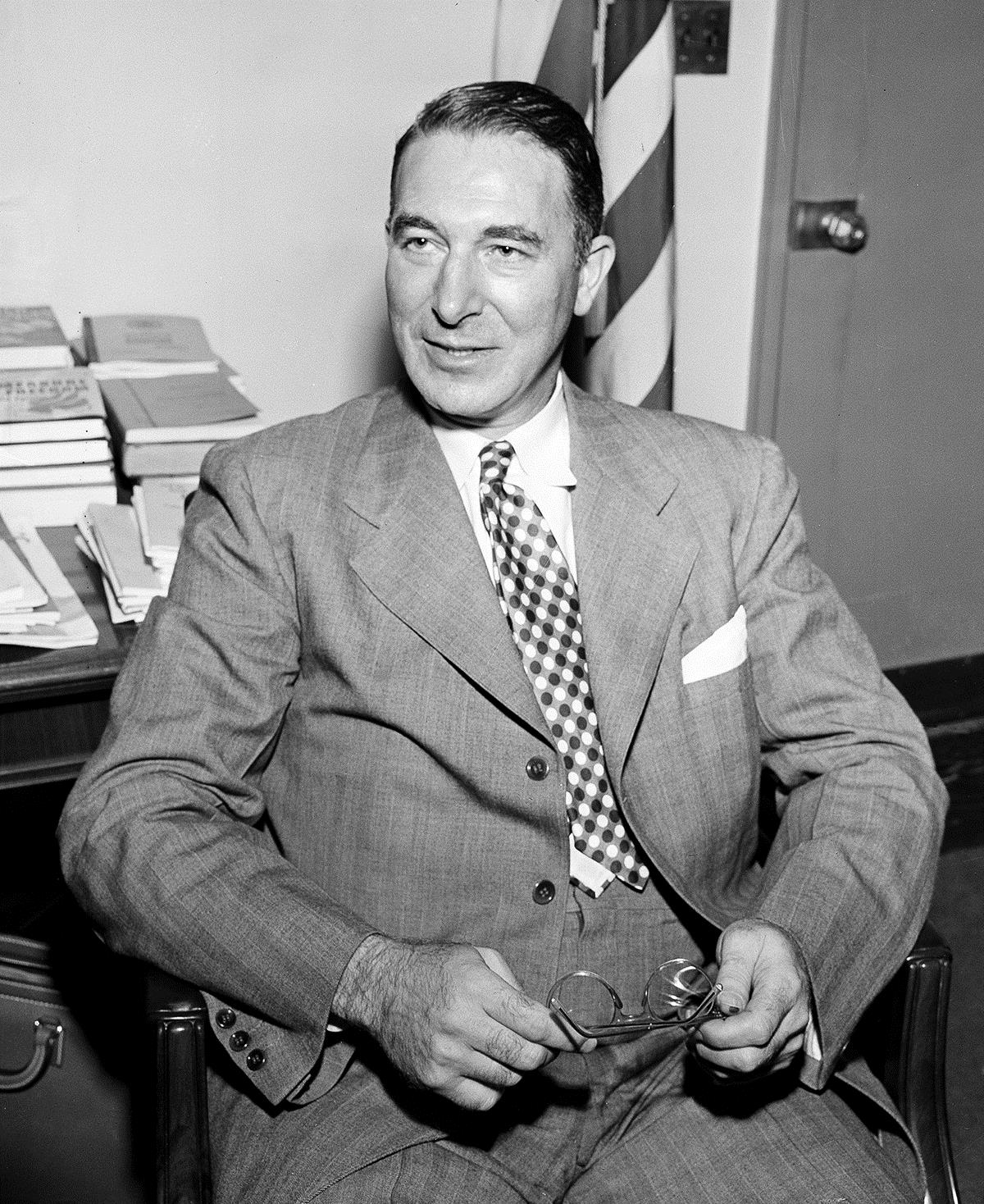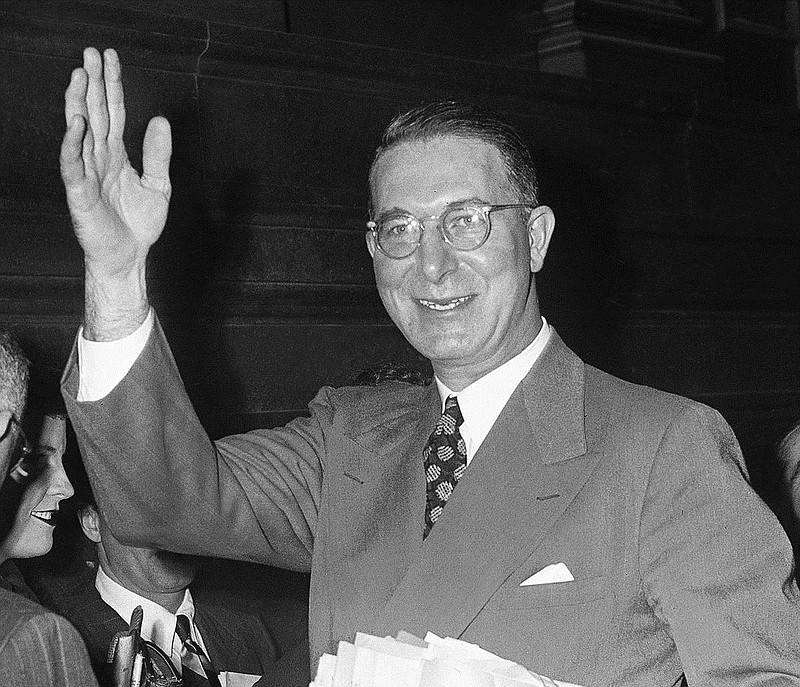Carey Estes Kefauver, well known as a congressman, U.S. senator and presidential candidate, got his start in Chattanooga.
Born in 1903 in Madisonville, Tenn., he attended the University of Tennessee at Knoxville, excelling in track, discus and football. The all-southern tackle earned the affectionate nickname "Old Ironsides." He graduated from Yale University Law School cum laude and came to Chattanooga to join Sizer, Chambliss and Kefauver in 1927.
Nancy Patterson Piggott, an "attractive Scottish lass," traveled to Chattanooga in 1934 to visit her aunt, Mrs. John Hutcheson. Estes forgot law and took the saucy redhead dancing at Fairyland Club on Lookout Mountain. She represented another world, having studied art in Paris and worked a year as an illustrator and designer in London. Estes was smitten, and they married a year later in Glasgow, Scotland, where her father, an American, designed engines for ocean liners including the Queen Mary and Queen Elizabeth. Eight years his junior, Nancy became mother of their four children and a tireless campaigner.
 Sen. Estes Kefauver (D-Tenn.), chairman of the special Senate Committee for the Investigation of Interstate Crime, is pictured in the office of district attorney Frank Hogan in New York, May 31, 1950. Hogan said he and Kefauver had been "talking about ways in which this office could cooperate with his committee and the senator has been indicating how in his judgment they can cooperate with us." (AP Photo/Jacob Harris)
Sen. Estes Kefauver (D-Tenn.), chairman of the special Senate Committee for the Investigation of Interstate Crime, is pictured in the office of district attorney Frank Hogan in New York, May 31, 1950. Hogan said he and Kefauver had been "talking about ways in which this office could cooperate with his committee and the senator has been indicating how in his judgment they can cooperate with us." (AP Photo/Jacob Harris)At home Kefauver became active in civic and political affairs with the Hamilton County Planning Board, the Chattanooga Bar Association, and the Volunteers, a reform organization. In 1937 he was chosen by the Chattanooga Jaycees as "Young Man of the Year."
Attorney Kefauver represented The Chattanooga News, a pro-union newspaper. When Kefauver made an anti-union speech to a local civic club, the News wrote scalding editorials. He later met with union officials and acknowledged being generally unaware of the "economic, political and human problems which led to the beginning and growth of the labor movement." He became a good listener to all sides, including management and labor, and increasingly became interested in politics.
He ran for the Tennessee Senate in 1938 but was narrowly defeated in the Democratic primary by fellow attorney Joe Bean, uncle of current City Judge Russell Bean. His strong showing led Gov. Prentiss Cooper to appoint him state commissioner of finance and taxation.
When Congressman Sam McReynolds of Tennessee's Third Congressional District died in 1939, Kefauver won the seat. Fred Travis, a Chattanooga Times reporter, wrote that Kefauver, the campaigner, was often late and would stumble and fumble along. At one stop, he said he was happy to see in the audience "my good friend Mayor Olgiati from my home town of Memphis." But he was highly intelligent and a good listener. He had an unusual way of connecting with people. Once in the U.S. House, Kefauver supported much of President Franklin Roosevelt's New Deal Legislation, including the controversial TVA act.
In 1948 Kefauver won the Democratic nomination for the U.S. Senate. The Crump political machine called him a liberal outside the political beliefs of Tennesseans "with the stealth of a raccoon." Donning a Davy Crockett-style coon skin cap, Kefauver went on television and remarked, "I may be a pet coon, but I am not boss Crump's pet coon!" Kefauver thereafter wore the coonskin cap given to him by local journalist Drue Smith and gained broad admiration for his integrity and boldness.
Once in the Senate, Kefauver was never in "the club." He was "too much an individualist to accede to the easy-give-and-take-you-scratch-my-back-and-I'll-scratch-yours" mode of political power. His Senate Antitrust and Monopoly Subcommittee investigated concentration in the U.S. economy and exposed monopoly prices in the steel, automotive, bread and pharmaceutical industries. He became a crusader for consumer protection laws and antitrust legislation. Kefauver's unpopularity with his party's machine in Tennessee only worsened when he voted against the Southern Manifesto, a pro-segregation document.
In 1952 he ran unsuccessfully for the Democratic Party nomination for president. He became Adlai Stevenson's running mate in 1956. Dwight Eisenhower won both elections.
Kefauver overwhelmingly won a third term in the Senate in 1960. He introduced his landmark legislation in 1962 requiring drug companies to disclose the side effects of their products, allow the sale of generic drugs after patent expiration and prove products effective and safe.
The exhausted senator died from a heart attack in 1963 at age 61.
His biographer called him a maverick and one of the most successful politicians in American political history. The Democratic "pros" (Truman, Johnson, Kennedy, Rayburn) reportedly disliked him, contrary to their public statements. One memoir said he was too liberal for conservatives and too conservative for liberals. They knew he could not be bought. He was unfailingly, unflinchingly honest.
His wife chose for Kefauver's Madisonville tombstone: "Courage, Justice and Loving Kindness."
Jerry Summers is a partner with Summers, Rufolo & Rodgers. For more, visit chattahistoricalassoc.org or call LaVonne Jolleey 423-886-2090.
